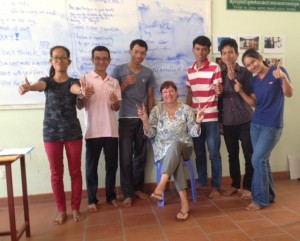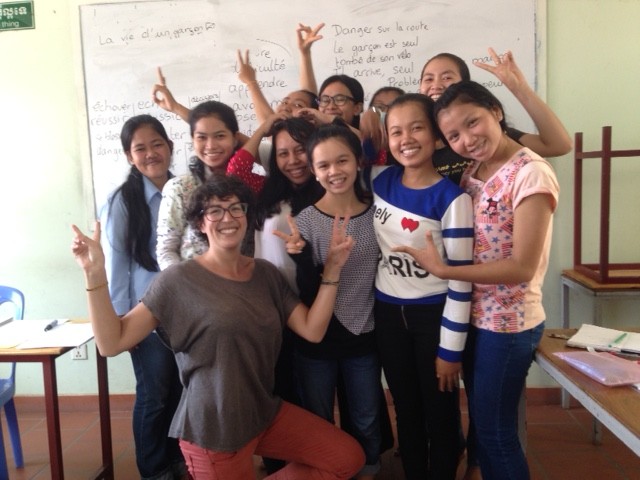My NGO, Writing Through, recently held 2 workshops in the Phnom Penh centre of Enfants du Mekong — one in English and one in French! Let me turn my blog over to the Facilitators, Lisa Edmondson and Anne-Estelle Bourgeon, for their reports. First, Lisa’s essay, and then Annou’s video. Enjoy, and thanks to our intrepid Facilitators!
Writing Through Phnom Penh, by Lisa Edmondson
It was Vesak Day, the day which celebrates the spirit of Buddhism throughout SE Asia. There in my in-box was a message from Sue Guiney, the Founder of the NGO, Writing Through, saying that she had an urgent need for someone to travel to Cambodia to do a Writing Through workshop for university students in Phnom Penh. I decided there was no better way to celebrate Vesak Day than to say ‘yes’. This would be my first Writing Through workshop, and I would be traveling alone. I was both nervous and excited as I boarded the plane from Singapore. Fortunately, what I had committed to turned out to be more wonderful than I could have imagined.
Writing Through works with students as young as primary school, but my assignment was to spend a week with a group of university students at the Enfants du Mekong center in Phnom Penh. Enfants du Mekong is a long-established French NGO dedicated to providing the poorest students with a better education. The Phnom Penh center focuses on university students, giving them housing, supplementary classes and a support system while they are studying far from home.
I arrived in the heat of a Sunday afternoon and was greeted by the smiles of Anne Estelle (Annou) Bourgeon and Helene Delatouche, two young French graduate students who are each spending a year at the Centre. Annou and Helene whisked me away in a waiting tuk tuk to visit the Centre and see the classrooms where we would be holding the five day Writing Through workshops for two groups of students. Annou would be teaching the workshop in French and I would be teaching the same workshop in English. The theme for both workshops would be “Taking Risks.”
The five day workshop format has been carefully developed by Sue Guiney. Carefully constructed to help the students gradually build confidence and competency expressing themselves, the first day is spent brainstorming and then writing a group poem. The second day gives the students the opportunity to write their own poem and perform it for the group. On day three, we write a story together, on day four, students write their own stories, and on the final day we fine-tune our work to prepare it for publication in a magazine and practice our presentations for “The Big Event”: a performance and celebration that brings together all that has been learned.
Our theme of “Taking Risks” was very appropriate for students who have left their families and villages to come to the big city. Later, they confided in me about their fears when they first arrived. The city was so noisy compared to their villages, and it felt hard to breathe. They were strangers to one another, and many worried about family members at home. But, over time, they have come to see that risks are necessary to achieve success, and their poems spoke of overcoming obstacles, facing fears, and not giving up. Their group poem began:
The opportunity is in your hands. You can be success or failure.
Oh dear, you can do it!

And do it they did, writing poems about friendship, hope, fairness, the importance of voting for good leaders, gratitude for parents and even love poems.
The students in my class ranged in age from 20 to 26 and had all signed up to participate in the class as an enrichment activity. This means they had volunteered to get up by 7 during their summer holidays to bicycle to the Centre for our 8 a.m. start. Their English teacher, Im Sopheak, acted as our translator, and served as an invaluable resource for me when we were explaining complex instructions. Although all the students were in level 2 or 3 in English, they were unaccustomed to my American/Australian accent and later confessed to me that it took time to get used to it. I think I speak clearly, but they are accustomed to English with a lilting French or Khmer accent!
Sue had coached me to ask the question: “Who will be brave and take the risk to write the first line?” And so, with the help of some images I had brought along of Cambodian teenagers skateboarding, jumping into the water, getting married, riding bicycles, and voting in elections, we began. Words and phrases flowed out of the back of their brains and into their mouths and onto the whiteboard. Words like die, injure, sad, suffering stood beside happy, famous, talented and young. The colors of “taking risks” were red blood and blue. As expressions like “lovely baby” “I miss you” and “Oh dear” started to surface, we were ready to begin to write our poem, which we eventually voted to call “The Meaning of Life.”
When we wrote our group story, we started by brainstorming about the key elements of Who, Where, When and Why. Though none had ever been away from Cambodia, they were all interested in writing about Thailand or Myanmar, and chose settings like discos, the beach and school. But eventually, the story that emerged was a universal morality tale with a happy ending about the consequences of making bad choices called “David’s Terrible Mistake.” The students showed a keen understanding of the importance of dialogue to bring a story to life, and the voices of the characters emerged naturally as the story unfolded. Because they are close to beginning their own careers beyond university, the stories in my class didn’t have the fantasy elements Sue has seen in other Writing Through classes. There were no ghosts or giants, fairies or jungle animals. These stories were about real young adults facing real challenges: what do you do when your parents can’t afford to help pay for your education, a family member gets sick and dies, or your family members don’t understand the importance of protecting the environment?
The Writing Through finale was scheduled for 6 p.m. on Saturday night and almost all of the 155 university students in the Centre were on hand for the “Big Event.” The students were nervous but resolute. After an introduction by the Centre’s French Coordinateur, Loic, the students from the English class read their group poem together in strong, unified voices, and then each of the students read one piece of their work individually, alternating between the French and English poems.
At the end, my eight English class students took to the stage for the performance of “David’s Terrible Mistake,” narrating and acting out their creation. Annou and I were both so proud of all the students, whose language skills and confidence had grown by leaps and bounds during the weeklong programme.
After polishing off a tableful of fruits, biscuits and soft drinks, someone hooked up the sound system and the dancing began. Traditional Khmer dancing involves girls and boys dancing in groups, without touching, in a sort of circular line dance with a two-step foot motion and hands rotating gracefully like Apsara dancers. When the music changed to Western pop, they danced in lines or smaller circles, and everyone knew the dance to Gangum style. Annou, Helene and I all joined the dancing, and by the time I went back to my guest house at 9 pm, I was exhausted and dripping with sweat, but oh so happy.
My official volunteer assignment was over, but before my flight left at midday, five of the students in my class had asked whether they could take me to see some sights in town. So at 7:30 a.m. we headed to the Tuol Sleng museum, a former high school that became a prison and place of torture during the Pol Pot regime, and has been kept intact so that its terrible past will not be forgotten. Born long after the Pol Pot regime and civil war, my students were particularly aware of the risks of power and corruption, and nodded solemnly when I reminded them that it was the responsibility of their generation to use their education and intelligence to lead Cambodia into the future. To end things on a lighter note, they had planned an excursion to the shiny new AON shopping mall, evidence that some are reaping the benefits of Cambodia’s rapidly increasing GDP. After a week in Phom Penh’s chaotic streets and the air-con free classrooms of EDM, it was culture shock for all of us! We rode the escalators up and down, spent a wonderful hour in an arcade, and ended the morning with a snack of pizza and iced tea. When we said goodbye at my hotel, I took one final photo, of the students smiling at me, their fingers forming hearts.
These students and this experience have left imprints on my heart and I am so glad to know that when the next opportunity for a Writing Through workshop comes to Phnom Penh, we will have lots of students raising their hands. And in the meantime, thanks to Facebook, we stay connected by the thread of our experience, across fields and oceans and mountains and borders and cultures, linked together by this very special experience.


Recent Comments